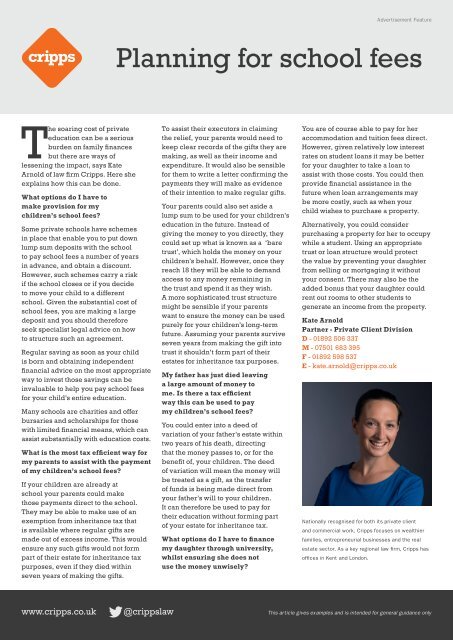Wealden Times | WT171 | May 2016 | Restoration & New Build supplement inside
Wealden Times - The lifestyle magazine for the Weald
Wealden Times - The lifestyle magazine for the Weald
You also want an ePaper? Increase the reach of your titles
YUMPU automatically turns print PDFs into web optimized ePapers that Google loves.
Advertisement Feature<br />
Planning for school fees<br />
The soaring cost of private<br />
education can be a serious<br />
burden on family finances<br />
but there are ways of<br />
lessening the impact, says Kate<br />
Arnold of law firm Cripps. Here she<br />
explains how this can be done.<br />
What options do I have to<br />
make provision for my<br />
children’s school fees?<br />
Some private schools have schemes<br />
in place that enable you to put down<br />
lump sum deposits with the school<br />
to pay school fees a number of years<br />
in advance, and obtain a discount.<br />
However, such schemes carry a risk<br />
if the school closes or if you decide<br />
to move your child to a different<br />
school. Given the substantial cost of<br />
school fees, you are making a large<br />
deposit and you should therefore<br />
seek specialist legal advice on how<br />
to structure such an agreement.<br />
Regular saving as soon as your child<br />
is born and obtaining independent<br />
financial advice on the most appropriate<br />
way to invest those savings can be<br />
invaluable to help you pay school fees<br />
for your child’s entire education.<br />
Many schools are charities and offer<br />
bursaries and scholarships for those<br />
with limited financial means, which can<br />
assist substantially with education costs.<br />
What is the most tax efficient way for<br />
my parents to assist with the payment<br />
of my children’s school fees?<br />
If your children are already at<br />
school your parents could make<br />
those payments direct to the school.<br />
They may be able to make use of an<br />
exemption from inheritance tax that<br />
is available where regular gifts are<br />
made out of excess income. This would<br />
ensure any such gifts would not form<br />
part of their estate for inheritance tax<br />
purposes, even if they died within<br />
seven years of making the gifts.<br />
To assist their executors in claiming<br />
the relief, your parents would need to<br />
keep clear records of the gifts they are<br />
making, as well as their income and<br />
expenditure. It would also be sensible<br />
for them to write a letter confirming the<br />
payments they will make as evidence<br />
of their intention to make regular gifts.<br />
Your parents could also set aside a<br />
lump sum to be used for your children’s<br />
education in the future. Instead of<br />
giving the money to you directly, they<br />
could set up what is known as a ‘bare<br />
trust’, which holds the money on your<br />
children’s behalf. However, once they<br />
reach 18 they will be able to demand<br />
access to any money remaining in<br />
the trust and spend it as they wish.<br />
A more sophisticated trust structure<br />
might be sensible if your parents<br />
want to ensure the money can be used<br />
purely for your children’s long-term<br />
future. Assuming your parents survive<br />
seven years from making the gift into<br />
trust it shouldn’t form part of their<br />
estates for inheritance tax purposes.<br />
My father has just died leaving<br />
a large amount of money to<br />
me. Is there a tax efficient<br />
way this can be used to pay<br />
my children’s school fees?<br />
You could enter into a deed of<br />
variation of your father’s estate within<br />
two years of his death, directing<br />
that the money passes to, or for the<br />
benefit of, your children. The deed<br />
of variation will mean the money will<br />
be treated as a gift, as the transfer<br />
of funds is being made direct from<br />
your father’s will to your children.<br />
It can therefore be used to pay for<br />
their education without forming part<br />
of your estate for inheritance tax.<br />
What options do I have to finance<br />
my daughter through university,<br />
whilst ensuring she does not<br />
use the money unwisely?<br />
You are of course able to pay for her<br />
accommodation and tuition fees direct.<br />
However, given relatively low interest<br />
rates on student loans it may be better<br />
for your daughter to take a loan to<br />
assist with those costs. You could then<br />
provide financial assistance in the<br />
future when loan arrangements may<br />
be more costly, such as when your<br />
child wishes to purchase a property.<br />
Alternatively, you could consider<br />
purchasing a property for her to occupy<br />
while a student. Using an appropriate<br />
trust or loan structure would protect<br />
the value by preventing your daughter<br />
from selling or mortgaging it without<br />
your consent. There may also be the<br />
added bonus that your daughter could<br />
rent out rooms to other students to<br />
generate an income from the property.<br />
Kate Arnold<br />
Partner - Private Client Division<br />
D - 01892 506 337<br />
M - 07501 683 395<br />
F - 01892 598 537<br />
E - kate.arnold@cripps.co.uk<br />
Nationally recognised for both its private client<br />
and commercial work, Cripps focuses on wealthier<br />
families, entrepreneurial businesses and the real<br />
estate sector. As a key regional law firm, Cripps has<br />
offices in Kent and London.<br />
www.cripps.co.uk @crippslaw This article gives examples and is intended for general guidance only


















